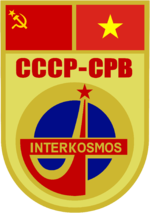Soyuz 37
| Mission emblem | |||||||
|---|---|---|---|---|---|---|---|

|
|||||||
| Mission dates | |||||||
| Mission: | Soyuz 37 | ||||||
| COSPAR-ID : | 1980-064A | ||||||
| Spacecraft: |
Soyuz 7K-T ( GRAY index 11F615A8) serial number 53 |
||||||
| Dimensions: | 6800 kg | ||||||
| Launcher: | Soyuz U (GRAY index 11A511U) | ||||||
| Call sign: | Outbound flight: Терек (" Terek ") Return flight: Днепр (" Dnepr ") |
||||||
| Crew: | 2 | ||||||
| Begin: | July 23, 1980, 18:33:03 UTC | ||||||
| Starting place: | Baikonur 1/5 | ||||||
| Space station: | Salyut | ||||||
| Coupling: | July 24, 1980, 20:02 UTC | ||||||
| Decoupling: | October 11, 1980, 06:32 UTC | ||||||
| Landing: | October 11, 1980, 09:49:57 UTC | ||||||
| Landing place: | 180 km southeast of Djeskasgan | ||||||
| Flight duration: | 79d 15h 16min 54s | ||||||
| Earth orbits: | 1256 | ||||||
| Rotation time : | 89.1 (91.4) min | ||||||
| Apogee : | 293 (358) km | ||||||
| Perigee : | 198 (345) km | ||||||
| Team photo | |||||||
 |
|||||||
| ◄ Before / After ► | |||||||
|
|||||||
Soyuz 37 is the mission designation for the flight of a Soviet Soyuz spacecraft to the Soviet space station Salyut 6, which started on July 23, 1980 . It was the twelfth manned visit by a Soyuz spaceship to this space station and the 59th flight in the Soviet Soyuz program.
crew
Starting crew
- Viktor Wassiljewitsch Gorbatko (3rd space flight), commander
- Phạm Tuân (1st space flight), flight engineer (Vietnam)
Gorbatko was the eighth Soviet cosmonaut to make three space flights.
Substitute team
- Valery Fyodorovich Bykovsky , Commander
- Bui Thanh Liem , Board Engineer (Vietnam)
Return crew
- Leonid Ivanovich Popov (1st space flight), commander
- Valery Viktorovich Ryumin (3rd space flight), flight engineer
Mission overview
It was the seventh visiting team ( Salyut 6 EP-7 ) to visit Salyut 6. This visit was also part of the Interkosmos program. During the visit, the fourth regular team Salyut 6 EO-4 worked with Leonid Popov and Valeri Ryumin on board. The research program of the sixth Intercosm team (approx. 30 experiments, including earth observations and recordings, material research, medical examinations) also included studies on the growth of a species of algae fern from Vietnam, which could be used for future closed life support systems.
Gorbatko and Tuân returned to Earth on the Soyuz 36 spaceship , leaving Soyuz 37 to the resident crew who used it to return to Earth on October 11, 1980. Popov and Ryumin had set a new long-term record for a space flight, and Ryumin also set a record for the longest total duration in space.
See also
swell
- Soyuz 37 at spacefacts.de
- Soyuz 37 at space.kursknet.ru (English / Russian , archived 2016)
- Soyuz 37 in the Encyclopedia Astronautica (English)
- Soyuz 37 in the NSSDCA Master Catalog (English)
